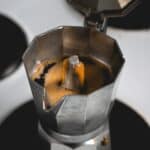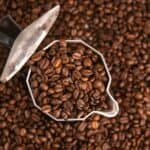7 Fixes for Bitter Moka Pot Coffee
Moka pot coffee is strong, bold and delicious… when you get it right.
Table of Contents
ToggleAt its best it can be your trusty companion in brewing that rich, aromatic cup of coffee that kick starts your day. But what happens when that morning ritual turns bitter? Unfortunately this is often the case with Moka Pot coffee due to a range of different factors.
With this in mind, here are 7 key fixes to reclaim the smooth, flavorful Moka Pot brew you crave.
What is a Moka Pot
The Moka pot is often referred to as a stovetop espresso maker.
It is an iconic Italian invention designed to brew coffee by passing boiling water pressurized by steam through finely ground coffee.
The Moka Pot uses heat to push pressurized, boiling water through ground coffee. This results in a strong, espresso-like coffee from this inexpensive device. Multiple chambers are used to separate the hot water at the bottom, the coffee basket in the middle, and the coffee collection chamber at the top.
This results in a potent brew that lies somewhere between espresso and drip coffee, boasting a robust flavor profile, full bodied mouthfeel and a velvety texture.
For more infomration on how to use a Moka Pot the right way, check out this post from Batch Brew, How to Use a Moka Pot Stovetop Coffee Maker.
Why Your Moka Pot Coffee Could be Bitter
Before diving into the fixes, let’s address the elephant in the room—why is your Moka pot coffee turning out bitter? Several factors could be at play here, from the grind size of your coffee beans to the brewing technique you employ. But fear not, as we’re about to dissect these reasons and arm you with solutions to banish bitterness from your morning cup of joe.
7 Reasons for Bitter Moka Pot Coffee, and How to Fix Them
Let’s cut to the chase. Here are 7 potential reasons that your Moka Pot coffee could be tasting bitter.
1. Over-Extraction:
Too much contact time between the coffee grounds and water can lead to over-extraction, resulting in a bitter taste. This is especially prevalent when you have ground your coffee too fine, as there is too much surface area for the hot water to come into contact with.
Solution: Grind your coffee a little coarser to shorten the brewing time. You could also build up your stovetop heat more gradually to make the coffee extraction a little more even.
2. Poor Water Quality:
If your water tastes off, it’ll reflect in your coffee. A common mistake that home coffee brewers make across a range of brewing methods is using regular tap water.
Solution: Use filtered or bottled water to ensure a clean, neutral base for your brew. Not only will this ensure your Moka Pot coffee tastes delicious, but it will also reduce the risk of limescale build up.
3. Incorrect Grind Size:
Using the wrong grind size can throw off the balance of flavors. As mentioned earlier, too fine will produce bitter results, whereas grinding too coarsely will leave you with under extracted, sour tasting coffee.
Solution: Opt for a medium-fine grind to achieve the perfect extraction without veering into bitterness. This should be between a filter and espresso grind, not too dissimilar to that used for an Aeropress.
4. High Brewing Temperature:
Brewing at excessively high temperatures can scorch the coffee, yielding a bitter taste. Whilst you need hot water to extract those essential coffee oils, if you use aggressive heat you could easily burn your coffee.
Solution: Keep a watchful eye on the flame or heat source to maintain a gentle, controlled brew. The coffee should flow consistently through the spout into the coffee collection chamber. If you are seeing spluttering, remove your Moka Pot from the heat or at leads turn your heat source down low.
5. Improper Heat Distribution:
Uneven heat distribution can result in inconsistent extraction, leading to bitterness in some parts of the brew. This is often a result of not preheating (or charging) your coffee brewing equipment, which is especially detrimental to intense extraction methods like the Moka Pot.
Solution: Preheat your Moka pot by adding hot water to the water chamber rather than cold. This ensures even heat distribution throughout the brewing process, helping you achieve a more even coffee extraction and reduces the risk of bitter Moka Pot coffee.
6. Old or Stale Coffee Beans:
Freshness matters when it comes to coffee beans. Using old or stale beans can result in a flat, bitter brew.
Solution: Invest in freshly roasted beans and store them properly to preserve their flavor. You can buy these from your local coffee house or online from coffee roasteries. Make sure they have a ‘roasted on’ date rather than a ‘use by’ date and you’ll know they’re nice and fresh.
7. Neglecting Cleaning and Maintenance:
Residue buildup in your Moka pot can impart a stale, bitter taste to your coffee. Your Moka Pot isn’t like a barbecue, leaving stains and residue on it doesn’t improve the flavor!
Solution: Clean your Moka pot regularly, ensuring that all components are free from residue and odors. Use hot, soapy water and a sponge to remove any coffee stains or oil build up, particularly in the silicone ring and screw grooves. Just make sure you don’t put your Moka Pot in the dishwasher or use a harsh metallic scourer, as you’ll almost certainly damage your Moka Pot beyond repair!
For more essential Moka pot tips and guidance, check out my article on the 17 key Moka Pot mistakes you should be avoiding.
Other Moka Pot Tips
Here are a few additional tips to help you get the most out of your Moka Pot.
- Experiment with different coffee bean varieties and roast levels to find your perfect match. Here are some of the best coffee beans that I would recommend using with a Moka Pot.
- Make sure to get your Moka Pot yield right. Think about how many people you are making coffee for using your Moka Pot, and how your brewing ratios can be altered to suit your audience.
- Don’t tamp down the coffee grounds in the filter basket—gentle leveling is all you need. In fact, tamping your Moka Pot could lead to a messy coffee explosion!
- If you want to try a cleaner, fresher tasting Moka Pot brew, consider using a paper filter. This can help reduce the amount of sediment that ends up in your cup, giving you a smoother cup of coffee.
Summary
In summary, bitter Moka pot coffee can be a result of various factors, including over-extraction, poor water quality, incorrect grind size, high brewing temperature, improper heat distribution, old coffee beans, and neglecting cleaning and maintenance.
By addressing these issues and implementing the suggested fixes, you can elevate your Moka pot brewing experience and savor the rich, nuanced flavors it has to offer.
If you’re looking for a complete guide that will help you step up your Moka Pot game from start to finish, check out my article on How to Use a Moka Pot Properly (Step by Step).
Bitter Moka Pot Frequently Asked Questions
While pre-ground coffee can work, freshly ground beans will yield a more flavorful brew.
Keep an eye on the top chamber—once it’s filled with coffee, remove the pot from the heat to prevent over-extraction.
Yes, there are Moka pots specifically designed for use on induction cooktops, featuring a magnetic base for compatibility.
It’s recommended to clean your Moka pot after each use to prevent residue buildup and maintain optimal flavor.





